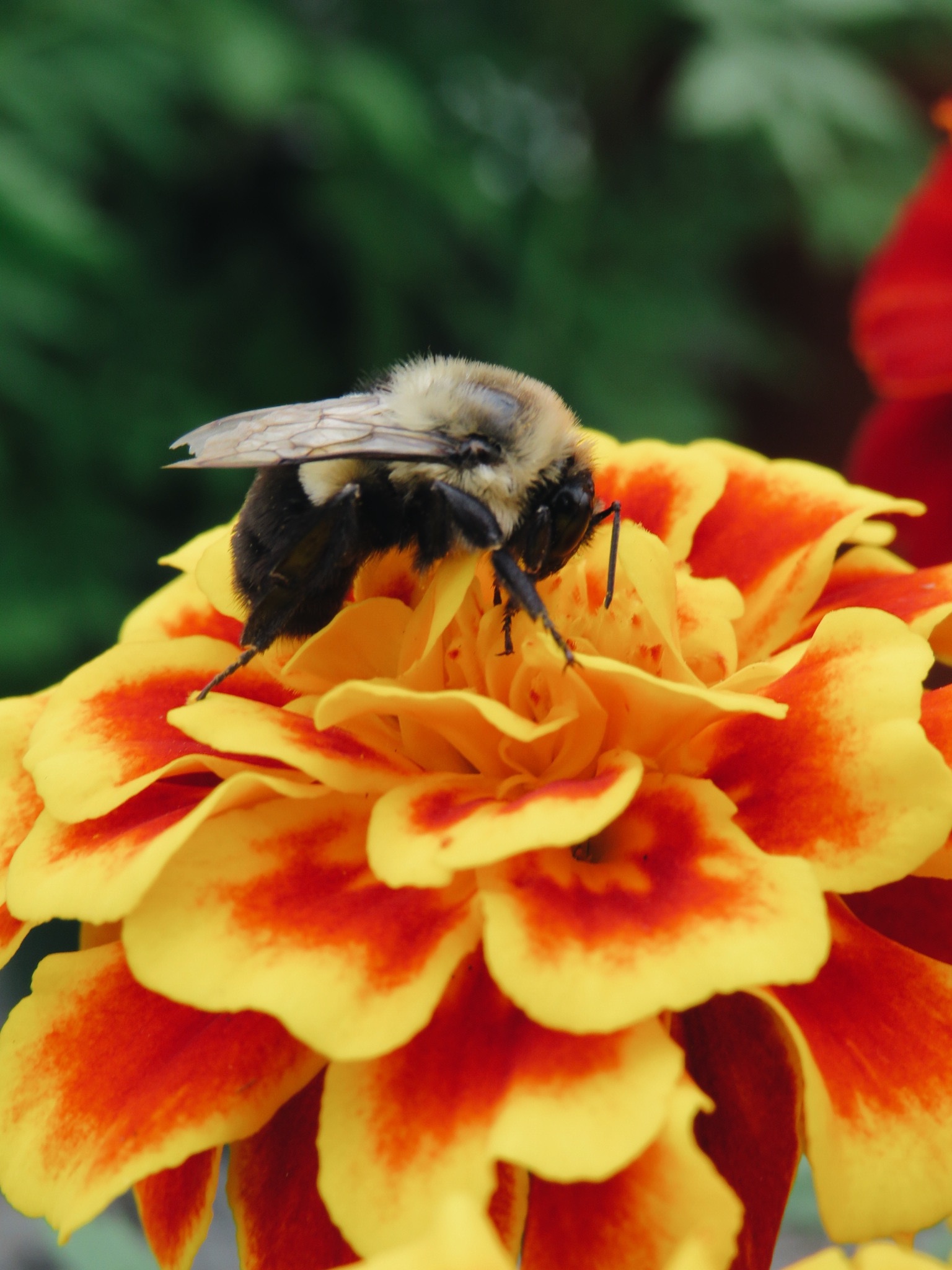With flowers blooming and gardens coming back to life across McGill’s campuses, there’s no better time to thank the fluttering friends who help green our spaces: pollinators.
World Bee Day, celebrated on May 20, honours one of the many pollinators species that keep our ecosystems happy and healthy. With many urban gardens on the downtown campus and the farm on the Macdonald Campus, pollinators play an important role within the McGill community. Just as we take care of our workspaces, some McGill students, staff, and faculty have created spaces that support the pollinators who help keep our campuses green.

“The aim of our meadow is to provide a safe space for them to thrive, which will have a positive ripple effect on the rest of the ecosystem and the McGill community,” explains Romey Karovitch, a U2 student studying Environmental Biology and head of outreach for the Macdonald Campus Pollination Meadow.
Launched in 2021, the Macdonald Campus Pollination Meadow aims to showcase how a simple lawn can be transformed into “an ecologically valuable space” for native plants and animals. In Fall 2021, the Meadow team and a group of volunteers cleaned and seeded a patch of land near Eco Residence and the Community Garden.
“It is important to step back and remember that we are all members of our ecosystems and the planet–just as much as any bird or lion or mushroom or blade of grass,” says Karovitch. “In this token, the reason to include as many people as possible in this effort becomes clear: the wellbeing of the environment affects all of us and is simultaneously all our responsibilities.”
The Macdonald Native Pollinator Habitat, also found in Sainte-Anne-de-Bellevue, equally aims to create a healthy home for pollinators while raising awareness of the important role that they play. The project, a collaboration with John Abbott College, will use the recently established spaces to observe wild bees and monitor their populations.
“Diverse urban and suburban habitats are actually great places to support wildlife, especially native pollinators, who really just need flowers and a bit of unkemptness to thrive,” says Dr. Frieda Beauregard, herbarium curator and lecturer in the Department of Plant Science.
“Helping support native pollinators is relatively easy in most greenspaces,” Beauregard continues. “I see the land of McGill University as a part of this biome and a place that can be managed to both support native species and carry out its mission of research and education.”
Both the Mac Pollination Meadow and the Macdonald Campus Native Pollinator Habitat got their start thanks to support from McGill’s flagship Sustainability Projects Fund (SPF). The SPF builds a culture of sustainability on McGill’s campuses through the seed-funding of interdisciplinary projects. It is the largest fund of its kind in Canada, valued at $1 million per year, and is open to all McGill community members.
Supporting urban biodiversity
At the downtown campus, Ingrid Birker, former outreach coordinator for the Redpath Museum, says she has noticed a considerable increase in the “diversity and numbers of insects, birds and animals that are essential for pollination in an urban environment” over the past decade.
While at McGill, Birker managed several urban gardens, including the pollinator patch on the west side of the Redpath Museum and a native medicinal herb garden south of Burnside. A team of student volunteers, including Katelyn Law, Johanna Arnet, Ella Martin, Sunny Han, Tairan Wu, and Francis (Quang-Hai) Dinh, are now caring for the spaces.
“In the pollinator patch beside the [Redpath] Museum, that was once used for decorative flowers that were thrown out at the end of the summer, we now have the self-seeding calendula, or the perennial chamomile and Echinacea, that support the butterfly and other nectar feeders, who then transport pollen across campus,” Birker explains.
A map created by Birker allows users to explore urban green spaces near the downtown campus and includes more details about the pollinators who visit.
“As managed honeybees suffer from population declines, increased demand, and impacts from a number of environmental factors, it’s encouraging to know that at McGill there are still wild bees ‘waiting in the wings,” says Birker.
Bring on the bees!
How can you support pollinator pals at home?
“Be messy!” says Beauregard. “Bees and other organisms need your old leaves for protection from the cold over the winter, they need the old stems of plants to make nests, old wood is part of the ecosystem too, so don’t get rid of it.”
As you prepare your garden for the summer season, keep in mind that “there really are no bad flowers when it comes to helping pollinators,” Beauregard continues.
Karovitch agrees: “It seems obvious, but pollinators love to, well… pollinate! And flowers are what they need to do just that!” She suggested focusing on planting native plant species in your garden to invite bees and other species in.
And don’t be intimidated if you have limited outdoor space. Student volunteers caring for the Redpath Museum gardens suggest using planting native species in containers on your balcony or prioritize buying and eating local produce as other easy ways to support local pollinators.
Learn more about some of the best pollinator supporting plants to include in your garden in this guide written for the Montreal region by Taylor Yeung, Dr. Gail MacInnis and Serena Sinno.
